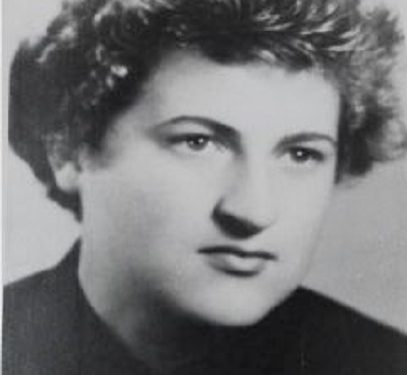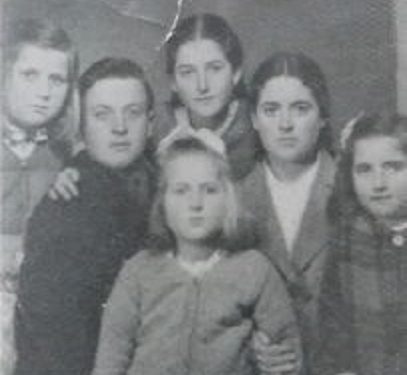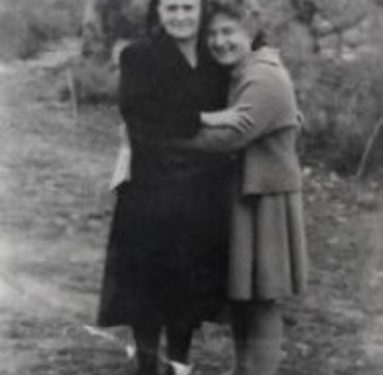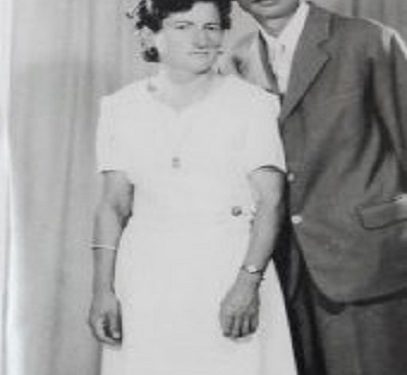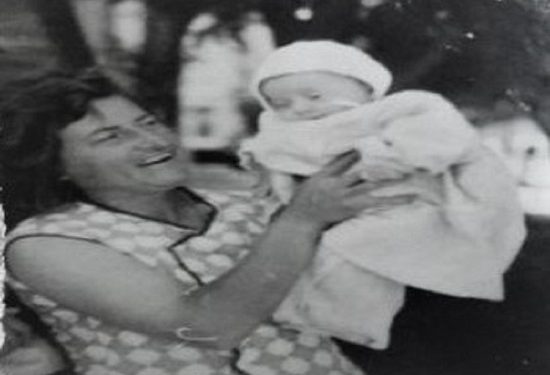By Najada Pendavinji
Memorie.al / Shpresa Baholli Merdani is one of the persecuted of the dictatorial communist regime of Enver Hoxha, who spent her childhood through pain and extreme poverty, and as a woman and mother, she faced difficult challenges in her life , created by the regime of that time. Her origin is from a large and prominent Korça family, the Ballolli family, which was persecuted by the communist regime of Enver Hoxha and his successor, Ramiz Ali, for up to five generations, going through a long ordeal of hardships and suffering. Shpresa, the daughter of Veli Ballolli, has suffered the brutal class war system and persecution since 1969, where she was interned with her family, in Shtyllë te Vithkuqi, (the village, where the snow melts only in May), lived and worked there for 21 consecutive years, during which he experienced the joys and sorrows of life. The ordeal of suffering for him ended only in 1990, with the fall of the communist regime. At the beginning of the 90s, Shpresa became active with the Association of Former Anti-Communist Political Persecutions of Albania, in the city of Korça, serving this group for almost 25 years. For more about this and the whole history of her family, know Mrs. Hope in the interview that I have received and that we are publishing in full in this article.
Ms. Hope, can you first tell us something about yourself and how the communist persecution of your family started? Why was your father arrested and convicted?
I am Shpresa Veli Baholli (Merdani), the daughter of Veli Baholli from the village of Suli i Bilishti. My father grew up an orphan, after his mother died at a young age, and his paternal grandfather, in order to develop the family’s economy, to raise his son with an education for work, sent him to America at the age of 16. My father stood out as a hard-working, hard-working boy who tried to collect everything he earned and send it to his father. He worked for 13 years on the railroads of America, where they broke the ice, so much so that his father said that they worked so hard, not only for him, but also for the other cousins who were together in America, that the muscles in their arms fell off from the cold. My father was very patriotic and he wanted to invest the money he earned in America here in Albania, as he was very connected to his family and his homeland. As soon as he returned from America, he donated the profit to his father, where they both bought a land of 500 dunyms in Llabanica of Trestenik, on the border with Greece. There the father built houses, built pantries for small and fat cattle, plevica to keep zahir, mill to grind bereka, that is, he created a strong economy to support the family. The father was very hospitable, whoever came and knocked on his door, be they Greeks, Macedonians, Ballistas or partisans, he opened the door to shelter and feed them. I remember when my father told me that he helped them so much that he took berekas to the partisans even in the village of Lavdar in Korça. The war is over…! Perhaps the liberators had in their program that these people, who were hardworking and heard in that province, would be persecuted in order to teach others. One day, the father is included as a member of Devolli’s Deputies group. At that moment he was plowing in Llabanica, on the land that had been left to us, as we were removed from Llabanica as a family and taken to Trestenik, to another settlement where the only thing left was this land. And the father tells his brother, Hiqmet, to come when he gets off the oxen from work, and graze them in the pastures in Çiflik. So the brother, together with a cousin, went to Llabanica, just as his father ordered. When they arrived at one point they saw the father between two soldiers with machine guns, who did not even allow them to meet each other. But the only thing his father said to him was: “Hikmet, get off the yoke and graze”. This little 10-year-old boy was, frightened by what he saw, says to him: “Dad! What do you have? Why did the soldiers take you? What have you done”? And the father kept telling him: “Go Hiqmet, calm down”! And that’s what the brother did…!
What happened to you while your father was in prison?
The father was put in prison and he left the mother with six children and the grandmother with seven. I was little at that time, about 5 years old, but I still have it in my memory today, when my mother was crying, shouting: “What am I going to do in the desert with 6 children, in a foreign village”?! Initially, the father was sentenced to death, although he had not done anything, on the contrary, as I told you, he had helped the partisans during the war. Later, they reduced his sentence to 101 years, of which he served 15 years in prison. From that time mother wore black, and until the day she died, I never saw mother wear a light dress, or put on a white headscarf, but only in black. She set herself the goal of raising us, educating us, educating us as her children. While father was in prison, we would try to survive. The brother was put to work in Vêntrok, (Train), he was small and distributed water to the workers who worked there. The sufferings were very great; we had no bread to eat. In the families where we had friends or relatives, no one helped us, as they too were afraid of persecution. Some benevolent person gave the mother and grandmother, from 3 to 5 kilos, corn flour. Dritëskura, mother, collected herbs (sparrows or sedges), grinded them and made porridge with cornmeal for us children to eat. Due to this difficult situation where we lived, the mother was forced to come to Korça, looking for work, where someone happened to be kind and put the mother to work on the farm. And we little girls, little sisters, would go after her and collect poppies, maraqkas, tartullas, and take them to the medicinal plants shop, which we would sell, earning 50-60 ALL a day, according to the flowers we collected. After the day, we didn’t spend the day playing like other children, but we went to the handicraft enterprise, where they gave us straw from rye, and we wove this straw to make hats.
During the time your father was in prison, did you have a chance to meet him?
The first time we met my father in prison, I don’t remember, because I was very young, but my short-sighted mother told me that when my father was brought to the Great Prison, here in Korça, maybe here in this building where it’s us now, we met it together. When I was little, I had a wound on my head that my father always treated with the medicine he found, of course before the arrest. During the meeting, I showed it to my father, saying: father, look, my wound has healed, my hair has started to grow! And the father cut the light, he was crying. And then one of the policemen who was standing there during the meeting, says to the mother: “Take this child out, because he missed us all.” I spoke to my father with a lot of love, with a lot of compassion, I told him about my sisters and my brother. The other time was when the father was serving his sentence in the Rinas camp. Although the years had passed and during this time the father had also experienced other camps such as: the Rrogozhina camp, the Peqin-Kavajë Canal, Levan-Shtyllë te Fieri, etc. But we did not have the economic opportunity to go and meet him in these camps. While when he was assigned to the Rinas camp, where the Rinas Airport is today, we went, the five sisters, together with the brother, who at that time was a soldier in the Neck of Kruja, but he managed to come and that’s how the six of us went the children and we met him in Rinas. We waited there from 9:00 in the morning until 4:00, when the prisoners left work and returned to the camp. I remember my father as now, in a place surrounded by barbed wire. And when after many years, after my father had passed away, I went to Rinas, as we were waiting for a relative, I could hear my father calling me: “Hope, here I am”! These are very difficult times. After he was removed from Rinas, my father also worked in the Tirana Sanatorium, and there the same thing happened to me, as if my father was talking to me: “Wherever Hope steps, I am here.” The years of the father’s prison passed, and during this time he wrote to the mother: “Hasbie, I want you to send the three little maids to school and, if possible, to the Pedagogical school, to become teachers, because the teachers are honorable girls in all the people of the world”… and we granted him his wish. We studied the two sisters in the Pedagogical school, while the younger one was not given the right to study because, as it was then, the framework for education was completed, and they did not give him the right to Pedagogical. So there were only two teachers, Fëlleza and me. We worked diligently, we were regular, we loved the children, we entered their world, and we were preoccupied with everything good or bad about them. And today that they have grown up, where someone has become a doctor, someone a teacher, someone has taken another profession, when they meet us, they respect us. This is an achievement, a success of our noble goals. We have been decorated by the President of the Republic, with the “Naim Frashëri Order of the second class”.
When did your internment start?
After his father’s sentence was over, he first got a job at the State Construction Company, in some constructions that were being done in the city of Korça, and then he was sent to Pyjore. We, some of the children got married, my brother also, while I was single, unmarried; I was a girl at home. In 1969, they warned us to remove us from the city of Korça. They called the father to the Executive Committee of the city and warned him to get his clothes ready that he would run away to the village of Shtylle t Vithkuqi, as a family. Always obeying the government’s laws, we never disobeyed its orders. We too, like a good part of the citizens of Korça who were expelled from the city, were taken by the police and taken to the village of Shtylle. There they sheltered us in the houses that were empty, as part of them were made for the volunteers, but they could not resist the cold of that place and pierced us. It was a house, where half of the roof was covered with straw and the other half had some tiles. The wall from the upper side, water flowed. But as I told you, my father and brother were also very hardworking and they fixed that house, opened canals around it, so that the water could drain outside and made it a place to live, where we stayed for 21 years. At first the work was very difficult because I was a teacher for almost 8 years and now I had to work in agriculture. My hands were killing, I was getting blisters. I would get up in the morning and say to my mother: “Oh, my mother, how will I work today? I am very tired! I have not rested at all at night”! Dritishkurtra tells me: “Mother’s daughter, pray to God before you start work and he will give you the strength to finish your work even today.” Sometimes he would heat the tail of a shovel or some other tool on the stove and tells me; Squeeze the tail of the shovel to dry these bubbles on your hands. My mother’s help, the courage she gave us, God’s strength, made me able to cope with the work in that village, which was a “Siberia” of Stylla, for a quarter of a century.
How was life there in exile?
I do not erase from my memory the difficult moments we spent in exile. The differentiations that were made to us by the people of the party. They assigned me more difficult jobs in agriculture, since I had a bad biography and had to work like an animal even in the parts that did not belong to me. Earning less than her friends. There you found people indoctrinated to the core, which showed more and more contempt and malice towards us. I remember a moment when it was decided to convene the village People’s Council for me, because according to them, I was bringing fashion from abroad, doing embroidery. I was young and at that time I had to prepare the bride’s dowry, so in my free time, I did embroidery. However, another girl took my job as a model. The “red flags” of the Village Party organization understood this and raised it as a problem, calling me to the meeting. I was a learned girl, where I easily understood the extent of their intelligence and so I stood up and said: Look at me, where is my indoctrination of fashion behavior from abroad and its spread here in the Pillar. That I’m wearing a pair of my father’s pants with andra, a loose coat that fits me big, a pair of torn boots, and a hat with holes. Embroideries are part of our tradition and customs, which we must pass on to the coming generation, so that the traditions are not lost, as they are spiritual values and popular heritage of our nation. This shows that they had a paranoid fear of everything. I remember being shocked even today, when I came home from work in tears because they ate me in pieces for the amount of work I was doing, they didn’t even give me the sweat of my brow…!
Can you tell us, how do you remember the moment of the birth of your two children, there in the camp?
Like all young women, I had my dreams. I had given my word to Ylber Merdan, to tie their lives together. He was imprisoned, while I was exiled. I had promised Ylberi that I would wait for him and I really did. In 1977, Ylberi was released from prison and we met in Shtyllë, where we repeated our promise to each other once more and put an end to that story. He was released in March and we got married in July. We held a small ceremony; those people came who had followed us for other reasons there in Shtyllë, who also knew our history. It was a simple, beautiful ceremony and one with its own memories, since we were all prisoners and exiles. After a few days of marriage, Ylberi is assigned to harvest barley. The rainbow didn’t even know how to make a sickle by hand, let alone harvest barley. As we started work, I looked to my side, Ylberi was not there! I said to myself, what happened when I saw that he was sitting by the willow tree, where he had filled his eyes with tears and was tying up his finger, which he had cut with a sickle. I say: What’s wrong with you? And he turns to me: “Why did you want to marry me, I can’t support myself and I can no longer support you and my family”! And to calm him down, I told him that I will work for both of them and that day I did two rates. The love was great. The days passed one by one, I was pregnant with the first child, but there were not always easy jobs, I was older, to create a family and the difficulties of the burden were the greatest. That is, I wanted a more humane treatment, I had the medicines that the doctors had given me, but I also wanted the food or work to be a little better and easier, to give the child the opportunity to develop in the womb. The months passed with difficulty, the day of the child’s birth came, I went to the village midwife who told me that you are ready to give birth, but we don’t have a car to take you to Vithkuq. It was March 30, but there was still snow in Shtylla, the road was covered with ice, cars did not come. Then Ylberi is obliged with his brother and sister-in-law, they took me on foot, to take me to Vithkuq. We went to a certain place, where I could resist the pain, I couldn’t walk any further, I couldn’t even take a step. So I’m sitting on a rock and I say to Ylberi: “I can’t anymore, I can’t come, I’ll stay here, and you go”! Then Ilberi, (he is also a believer in the great God) says to me: “Hope! Pray to God and God will help us, give us strength to reach the hospital”. So we did. They took me to a deck together with my brother-in-law and lifted me up. We arrived at the hospital; I gave birth to the girl, thanks to the help of the midwife, Marika from Vithkuqi. The girl was born, but she was losing weight, she was not having sex, she had to be seen by the doctor. The mother was not allowed to come home, to visit the child, as we were declassified. Then, together with my sister-in-law, I was forced to go to Vithkuq hospital, where Ylberi was not allowed to accompany me, because he was a political prisoner. We arrived in Vithkuq, where the ambulance was called and they brought me to the Pediatrics of Korça. But think about it, we were dressed in boots, old coats, and when the Pediatricians saw us in this condition, they were bringing us around, I don’t put him down, I don’t put him down. In conclusion, a good-hearted doctor comes, admits me to the hospital, me along with the child. I spent several months in the hospital because the child was not developing. After a few months, I left the hospital, but it is understood that the child wanted treatment, wanted better food, while we were only given 300 grams of bread per family, and we were a big family and it didn’t work out even if we left it to the child. When Bardha turned 7 months old, then another ordeal of diseases began that she had. It was the end of October, then in Shtylle on October 24, more than 40 cm fell snow, where the People’s Council did not allow the village midwife to come and treat the child. So we are forced to go on foot, breaking through the snow, to take the child to the hospital. We arrived in Vithkuq with an almost finished child and an ambulance is coming, but Ylberin, the Operative Security Worker of the area, stopped it to accompany me! So I was forced to go to Korça hospital myself, where I stayed for a month and after that they sent me to Tirana, for almost 6 months, as the child’s temperature did not drop. The behavior of the doctors of Tirana was quite different from that of Korça. They also took care of the place of the child’s bed, so that the wind would not catch it. When my child got sick and completely lost consciousness, there was a doctor who visited him, (Sami was his name), and he was the Head of the Pavilion. I begged him with tears in my eyes, saying: Aman, doctor, please save my child! And he told me that: we will do the impossible, but it is in someone else’s hands, it is up to God who will save him or not. After three months, they lowered Bardhë’s temperature, from 39 oC, to 37 and a half, and discharged me from the hospital. God forgave my child.
What happened after you returned from exile?
I was interned for 21 years. On August 6, 1969, we were exiled from Korça to Shtylle te Vithkuqi, but on August 20, 1990, we were released, and we were free to go and live in the city from which we were exiled, because they had us also removed the passporting from the civil status. The civil state that we had before in Korçë, they had already established in Vithkuq. They gave us the right to return to Korça, but they did not provide us with a house or a job. So we had to find a job and a house ourselves. Ylberi had a classmate, Lulezim Qerebeli, the chief engineer of the Brick Factory, and we went together with Ylberi to look for work. He was looking at me with a warning, that he did not believe that we could work at the heavy jobs he had at the Brick Factory. And I turn to Luli, saying: don’t worry, I’m a lady to work in very difficult places, either with a pick or a shovel, I load and unload cars, you wherever you have work, you’ll love me appoint a place to give me the opportunity, to get a salary to support the family. Then he put me to work in the Brick Factory, where I worked in the second ward, where you grinded the burnt coal. Everyone was amazed at the work I was doing in that ward, but I had no other choice and one must always adapt to the unexpected in life. As I worked for a year in that factory, since the first days of the democratic processes for changing the system, I was engaged and activated with all my might as a member of the Democratic Party, participating in every activity it did, such as in meetings with citizens , whether in the city or even in the villages. I remember that I went with Ylber to the village of Podgorie, where I was a teacher for 5 years. It was the first time that women participated in the meeting, but when they found out that it was Shpresa Ballolli, the exiled teacher of Podgoria, from Korça to Shtylle, all the women of Podgoria came to the meeting, where they gave their votes to the entire Democratic Party. After a few months, they sent me back to education, since I had graduated in Pedagogy and had worked as a teacher for 8 years. That’s how I worked for another 3 and a half years in education and from there I retired.
As a member of the leadership of the National Association of the Former Anti-Communist Political Persecuted of Albania and secretary of the Korçë branch, can you tell us the vicissitudes that political prisoners go through in gaining their rights at a time when the collective memory of communism must be kept alive?
After retirement I had power, I had a desire to help people who were like me persecuted without right, where they should get their rights. I became active with the Association of Formerly Persecuted Anti-Communist Democrats of Korça, where I worked for 25 years, serving this stratum. Be it for the making of the first documents since 1993, or for the current documents, for the compensation of political prisoners, which leaves a lot to be desired, because only three installments have been given to the heirs of these political prisoners and those shot given by the compensation, where not everyone has received this third installment. Thinking that they have suffered equally with ex-prisoners that they were in prisons, while their heirs suffered outside, helping them economically, working to support them with food, their parents or grandparents, or their people relatives who were in prisons. The day was not far away, when Ylberi was invited to the infamous Spaçi camp (which took me as a companion), where a meeting was held with several students. There, I was given the opportunity for the first time to see the cruel camp of Spaçi, where Ylberi had suffered all the punishment. I was surprised by that place so steep, so wild, in that small place, where more than 700-800 political prisoners lived, that I could not imagine it and I said to Ylberi: You say that here you were 1000 prisoner…! How has this country taught you? Where did you stay?! He told me that in that palace there were beds with three floors, where political prisoners lived. And leaving the camp, we saw the starless flag that Mersin Vlashi had drawn. I remember the day when Mersini was hospitalized in the Tirana Sanatorium and in the Court of Appeal; he was looking for proof of the prison and could not find it. And even worse today, it is said that those ex-prisoners who worked in the infamous Spachi and Qafe-Bar mine will receive compensation, but the government does not give them the certificates to receive this pension supplement. I will say one last thing that is left in my mind and maybe God will give me the strength to accomplish this. All this that I told you, was as a result of the land that my father bought in Llabanicen i Trestenik, and to this day, we have received the certificates that we are the heirs of this property, but we have not received a single inch of land! We have removed badly, as the “snake under the stone” removes, and in conclusion, we only enjoy those valuable cards! I am glad to hear from the Chairman of the Democratic Party that the law on property will be changed. May God change their minds and give the right to the owners of those lands. Memorie.al




